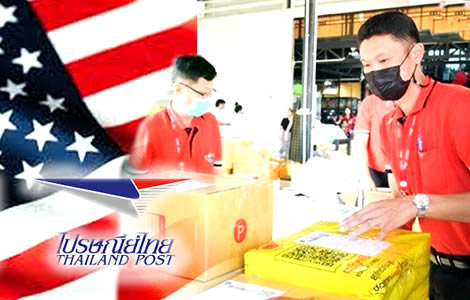Thailand Post suspends all U.S. parcel deliveries as the de minimis exemption ends, joining China, Hong Kong and other global carriers scrambling to comply with Trump’s new tariffs, leaving millions of shippers in uncertainty worldwide.
Thailand’s national postal service has suspended all parcel deliveries to the United States, following moves by China and Hong Kong in April 2025, as the de minimis waiver on small packages expires Friday, August 29. The halt mirrors actions by other postal services across Europe and Asia, leaving shipments to the U.S. in uncertainty. It remains unclear if Thailand Post will restart the service, while the U.K. Post Office is taking such an approach, planning a relaunch once a revised system is in place.

Thailand Post has suspended parcel delivery to the United States, effective Friday. The move comes directly in response to the U.S. ending the de minimis exemption. This change will affect millions of low-value shipments previously duty-free. Moreover, DHL and other national post offices are pausing deliveries for the same reason.
Earlier, postal services in China and Hong Kong paused U.S.-bound parcels in April. At this time, parcels can still be sent from Thailand through UPS and FedEx. Both carriers are now adjusting systems to comply with the heightened tariff regime, which begins August 29.
However, not all postal services are halting shipments permanently. The U.K. Post Office is temporarily suspending services while it implements a new system for U.S.-bound parcels. Meanwhile, carriers worldwide are scrambling to meet U.S. Customs and Border Protection (CBP) requirements.
Thailand Post suspension highlights the impact of the US ending the de minimis exemption on global deliveries
On August 22, Thailand Post Company Limited officially announced the temporary suspension of all U.S.-bound mail. The company cited delayed acceptance of mail by partners as a direct consequence of the de minimis rule change. Thailand Post confirmed the pause will continue until further notice.
Globally, carriers face unprecedented challenges. Millions of low-value parcels previously exempt from duties now require full customs compliance. DHL paused most global shipments to the U.S., citing uncertainty over the new rules. Postal operators warn that processes for duty collection and data submission remain unclear.
The de minimis exemption had allowed over four million parcels daily to enter the U.S. duty-free. These shipments, largely e-commerce-driven, now face tariffs and customs scrutiny. Nevertheless, gifts under $100 remain duty-free, according to the White House.
National postal services are reacting quickly. Korea Post will halt air parcels and some express services to the U.S. starting August 29. Premium services via private couriers remain available, subject to duties. Similarly, Singapore’s SingPost will suspend standard commercial shipments from August 28. Retail and corporate customers can still use Speedpost Express and Speedpost Direct International services.
Global carriers scramble to comply with new tariffs and duty rules after de minimis waiver ends next week
Japan warns of potential delays or returned parcels. Authorities say additional guidance will be issued once available.
European carriers are also responding. Norway and Finland will stop U.S.-bound deliveries beginning August 23. Deutsche Post and DHL Parcel Germany suspended business parcel acceptance via the postal network, though DHL Express continues operating.
DHL highlighted unresolved questions: who will collect duties, what data is required, and how CBP will receive it. Meanwhile, the Czech Republic has stopped U.S.-bound parcels. Austria will halt acceptance after August 25. Belgium’s Bpost will pause shipments from August 22 due to regulatory uncertainty.
Royal Mail UK plans a brief suspension for business account customers next week. The pause allows a revised system to manage new duties. Australia Post has temporarily stopped transit services for some third-country items sent via Australia to the U.S., while direct Australia-U.S. deliveries remain unaffected.
European and Asian postal services announce pauses and possible revised systems to handle new tariffs
Lufthansa Cargo will no longer accept airmail shipments to the U.S. starting August 25. General and other cargo types remain unaffected. A company spokeswoman said they are “working intensively to find a viable solution” to resume airmail services.
No official delays to the August 29 deadline have been announced. A Trump administration official said CBP issued a memo clarifying the policy to foreign postal operators.
The ending of the de minimis exemption is causing a seismic shift. Analysts warn cheap goods, especially from China, may move to other markets as U.S. import barriers rise. Previously, low-value parcels flowed freely, meeting consumer demand. The White House claims the exemption was abused to evade tariffs and smuggle illicit items.
Kate Muth, executive director of the International Mailers Advisory Group, said, “It is a real concern that the dominoes are falling. More posts will suspend packages to the U.S.”
Ending of de minimis exemption triggers ripple effect across global parcel and e-commerce networks
Once the exemption ends, duties will be based on country-of-origin tariff rates set under Trump’s emergency powers. Alternatively, packages may face temporary flat fees of $80–$200 for six months. CBP’s August 15 bulletin explained fee calculations, while guidance issued August 21 certified two companies to collect duties on behalf of international carriers.
Muth added, “The guidance is welcomed, but we are still a week away. Only two companies are approved to handle duties.”
The effects extend beyond mail carriers. Starting August 25, Etsy will suspend its shipping label service for U.S.-bound packages in Australia, Canada, and the U.K. The platform advises using carriers capable of pre-paying duties, such as UPS and FedEx. FedEx confirmed normal operations; UPS did not comment. The U.S. Postal Service did not respond.
Deborah Elms, trade and policy expert in Singapore, highlighted SingPost as an example. From August 25, standard commercial shipments to the U.S. will be suspended. Retail and corporate customers may use Speedpost Express or Speedpost Direct International. Document-only shipments remain unaffected.
Postal operators face operational and regulatory challenges due to new US tariff and duty rules
Hong Kong suspended U.S.-bound goods mail in April 2025 over the de minimis changes. Hong Kong Post warned residents to expect “exorbitant and unreasonable fees” due to U.S. policy. Authorities emphasised they will not collect tariffs on Washington’s behalf. Document-only mail is not affected.
The policy followed the U.S. elimination of the de minimis exemption and tariff increases on May 2, 2025. Hong Kong now faces the same tariffs as China. Observers note that these changes disrupt Hong Kong’s role as a global trading hub.
Postal operators globally are under immense pressure. The process is complex, costly and technical. Carriers must calculate duties, submit data and ensure packages meet CBP rules.
“This challenge is enormous,” Muth said. “Mailers, shipping companies and consumers must adapt quickly. Otherwise, they face delays and penalties.”
Only a few carriers currently have clear procedures. Others remain uncertain, scrambling to align operations with CBP guidance.
Hong Kong and China targeted earlier. Global postal networks under immense pressure over US tariff changes
E-commerce will be heavily affected. Small businesses, online marketplaces and consumers will face higher costs and delays. Postal operators and private carriers are searching for solutions, but federal guidance remains limited.
Experts warn that without planning, the transition may create long-term disruption in global trade. International postal networks, once accustomed to predictable low-value flows, must now adapt rapidly to tariffs and compliance rules.
Game changer US Thai trade deal approved at special cabinet meeting as 19% tariff rate warmly welcomed
Prime Minister orders government trade talks team to review US court order striking down Trump tariffs
Certainly, Thailand Post’s suspension is part of a global domino effect caused by the U.S. de minimis changes. Carriers worldwide are adjusting to new tariffs and duties. Businesses, consumers, and postal systems across Asia, Europe and the U.S. face a dramatically changing international mail landscape.
At this time, the Thai postal service has not announced if any revised arrangements will be put in place once the dust settles.
Join the Thai News forum, follow Thai Examiner on Facebook here
Receive all our stories as they come out on Telegram here
Follow Thai Examiner here
Further reading:
Last minute tweaks in Bangkok as deal is finalised with U.S. However, Thailand may not match Vietnam


















